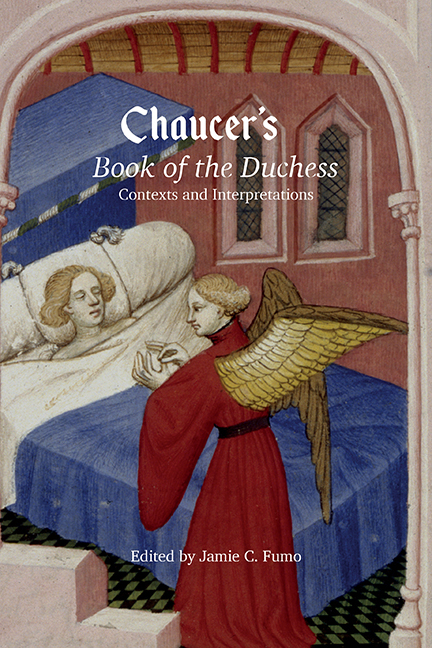Book contents
- Frontmatter
- Contents
- List of Illustrations
- Acknowledgments
- List of Contributors
- Abbreviations and Editions
- Introduction: Reopening the Book of the Duchess
- I Books and Bodies
- II The Intertextual Duchess
- 5 Alcyone's Grave: Inscription and Intertextuality in Chaucer, Spenser, and Ovid
- 6 Tribute to a Duchess: The Book of the Duchess and Machaut's Remede de Fortune
- 7 ‘Hyt am I’: Voicing Selves in the Book of the Duchess, the Roman de la rose, and the Fonteinne Amoureuse
- 8 ‘Counterfeit’ Imitatio: Understanding the Poet-Patron Relationship in Machaut's Fonteinne amoureuse and Chaucer's Book of the Duchess
- 9 The Shock of the Old? The Unsettling Art of Chaucer's Antique Citations
- 10 Response: The Book of the Duchess, Guillaume de Machaut, and the Image of the Archive
- Bibliography
- Index
- Miscellaneous Endmatter
5 - Alcyone's Grave: Inscription and Intertextuality in Chaucer, Spenser, and Ovid
from II - The Intertextual Duchess
Published online by Cambridge University Press: 18 April 2018
- Frontmatter
- Contents
- List of Illustrations
- Acknowledgments
- List of Contributors
- Abbreviations and Editions
- Introduction: Reopening the Book of the Duchess
- I Books and Bodies
- II The Intertextual Duchess
- 5 Alcyone's Grave: Inscription and Intertextuality in Chaucer, Spenser, and Ovid
- 6 Tribute to a Duchess: The Book of the Duchess and Machaut's Remede de Fortune
- 7 ‘Hyt am I’: Voicing Selves in the Book of the Duchess, the Roman de la rose, and the Fonteinne Amoureuse
- 8 ‘Counterfeit’ Imitatio: Understanding the Poet-Patron Relationship in Machaut's Fonteinne amoureuse and Chaucer's Book of the Duchess
- 9 The Shock of the Old? The Unsettling Art of Chaucer's Antique Citations
- 10 Response: The Book of the Duchess, Guillaume de Machaut, and the Image of the Archive
- Bibliography
- Index
- Miscellaneous Endmatter
Summary
Chaucer is the poet of unrealized endings; Chaucer is the Ovidian who habitually omits Ovidian metamorphoses; Chaucer is the father of English poetry. This essay argues that these critical commonplaces, notwithstanding their continued relevance and heuristic value, might all profitably be qualified, and that the Book of the Duchess, especially in its narrative of Ceyx and Alcyone, provides occasion to do so. Represented in Ovid's Metamorphoses, rewritten in Chaucer's Duchess, recast in Spenser's Daphnaida, Alcyone comprises part of a literary history linked around the grave: its connective powers, its memorial capacities, its metafictional possibilities. Ovid's Alcyone, envisaging the inscription on her own tomb, has a previously underexplored connection with the desperate lovers of the Heroides, and, as I suggest in part I, it shapes Chaucer's decision to excise her avian transformation from his retelling of the story. He refrains from faithfully representing the traditional Ovidian metamorphosis, but this, as the link with the Heroides implies, may attest his affinity with an earlier model in Ovid's career. Alcyone's plan for her tomb, further, marks in Ovid a potential but unfulfilled conclusion, and though Chaucer doesn't afford it to Alcyone herself, he incorporates its memorializing spirit into his dream about the bereaved Black Knight. The poet of endings finds an unrealized ending already in his predecessor, and transforms it into an artistic analogy between the monumental grave for the dead Blanche of Lancaster, constructed contemporaneously in St Paul's cathedral, and the monumental tribute for the dead White, constructed figuratively in his elegy. Spenser in Daphnaida, as I show in part II, draws on both Ovid and Chaucer in making a grave into what Robert R. Edwards would call a poetic emblem: ‘a self-reflexive statement about poetic art’ and its place in a literary tradition. With another epigraphic inscription, this one imagined by a newly male Alcyon, Spenser generates a transhistorical connection among several poems that doesn't rely solely on structures of genealogy or metaphors of literary paternity. His imitation of Chaucer, the father of English poetry, figures less as the descent from parent to child than as the touch between past and present.
- Type
- Chapter
- Information
- Chaucer's Book of the Duchess , pp. 97 - 118Publisher: Boydell & BrewerPrint publication year: 2018

